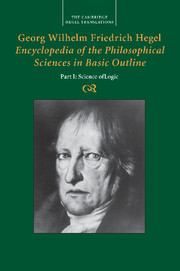 Georg Wilhelm Friedrich Hegel: Encyclopedia of the Philosophical Sciences in Basic Outline
Georg Wilhelm Friedrich Hegel: Encyclopedia of the Philosophical Sciences in Basic Outline Published online by Cambridge University Press: 30 September 2021
§19
Logic is the science of the pure idea, i.e. the idea in the abstract element of thinking.
The same proviso that holds generally for the concepts prefacing the philosophy – namely, that they are determinations drawn from and subsequent to the survey of the whole – also holds for this as well as other determinations contained in this preliminary conception.
It can indeed be said that logic is the science of thinking, of its determinations and laws. However, thinking as such constitutes only the universal determinateness or the element in which the idea exists qua logical. The idea is thinking not insofar as the latter is formal, but insofar as it is the self-developing totality of its distinctive determinations and laws, which it gives itself and does not already have and find within itself.
Logic is the most difficult science in that it has to do not with intuitions – and not even with abstract sensory representations as in geometry – but with pure abstractions. It requires a certain strength and versatility to retreat into pure thought, to hold on to it steadfastly and to move about in it. On the other hand, logic could be considered the easiest science, because its content is nothing but one's own thinking and its familiar determinations, and these are at once the simplest and the elementary sort of determinations. They are also what is most familiar, namely being, nothing, etc., determinateness, magnitude, etc., being-in-itself, being-for-itself, one, many, etc. This familiarity with them, however, makes the study of logic even harder. On the one hand, it is readily held to be not worth the effort to occupy oneself with such familiar things and, on the other, the point is to become familiar with them in a way that is entirely different from, indeed even opposed to, the way one is already.
The usefulness of logic concerns the relationship to the subject, namely, the extent to which the subject [thereby] provides himself with a certain education for other purposes. His education through studying logic consists in acquiring practice in thinking, since this science is a thinking of thinking, and in getting thoughts into his head [precisely] as thoughts.
To save this book to your Kindle, first ensure [email protected] is added to your Approved Personal Document E-mail List under your Personal Document Settings on the Manage Your Content and Devices page of your Amazon account. Then enter the ‘name’ part of your Kindle email address below. Find out more about saving to your Kindle.
Note you can select to save to either the @free.kindle.com or @kindle.com variations. ‘@free.kindle.com’ emails are free but can only be saved to your device when it is connected to wi-fi. ‘@kindle.com’ emails can be delivered even when you are not connected to wi-fi, but note that service fees apply.
Find out more about the Kindle Personal Document Service.
To save content items to your account, please confirm that you agree to abide by our usage policies. If this is the first time you use this feature, you will be asked to authorise Cambridge Core to connect with your account. Find out more about saving content to Dropbox.
To save content items to your account, please confirm that you agree to abide by our usage policies. If this is the first time you use this feature, you will be asked to authorise Cambridge Core to connect with your account. Find out more about saving content to Google Drive.